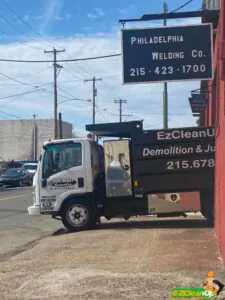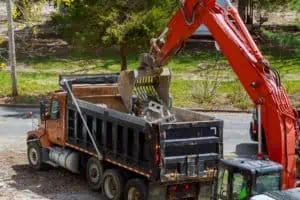Wooden pallets thrown into landfills can take years to decompose and may release chemicals or toxins into the soil and groundwater. Therefore, proper disposal is crucial. The best options for disposing of wood pallets include recycling, repurposing, and hiring professional junk removal services.
Recycling and repurposing are eco-friendly options, while professional services ensure efficient and compliant disposal. If you want to learn more about these top three options on how to dispose of wood pallets, read on.
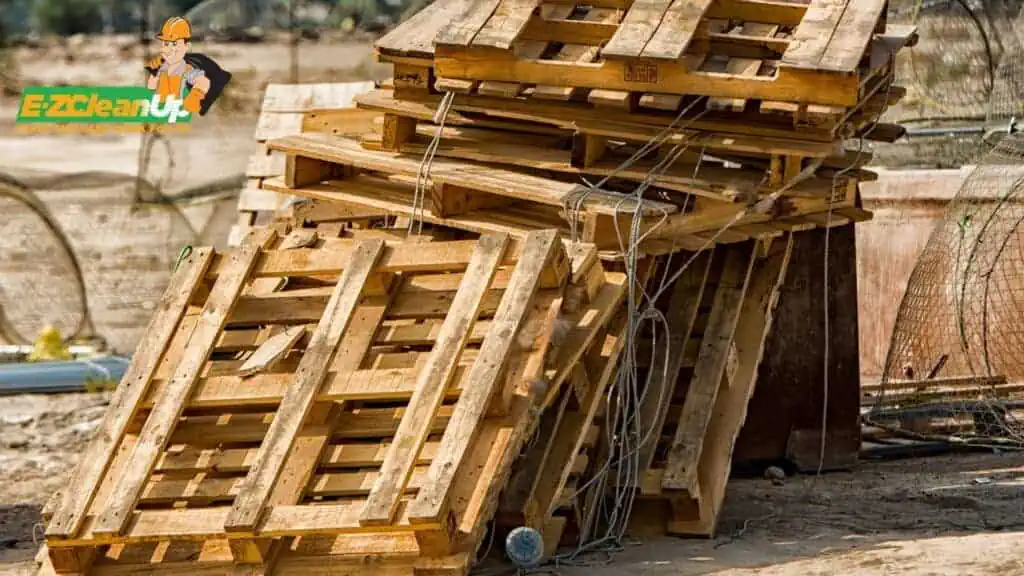
Option #1: Recycling Wood Pallets
You can find nearby pallet recycling centers through online directories, local council websites, or environmental protection agency resources. Some mobile apps are specifically designed to locate recycling facilities based on material types, including wood.
Locating a center close by reduces the carbon footprint associated with transporting the pallets. The closer the recycling facility, the lower the greenhouse gas emissions from transportation.
Accepted Types of Pallets
Most recycling centers accept various types of wood pallets, including stringer pallets, block pallets, and double-face pallets. However, the rules might vary depending on the condition and type of wood.
These facilities typically prefer pallets that are free from major damage, not excessively painted, and without chemical contamination. They may reject heavily stained or treated wood due to potential environmental hazards during the recycling process.
Some facilities also handle presswood pallets, engineered wood pallets, or even plastic ones, but it’s essential to check with the specific center for their acceptance policies.
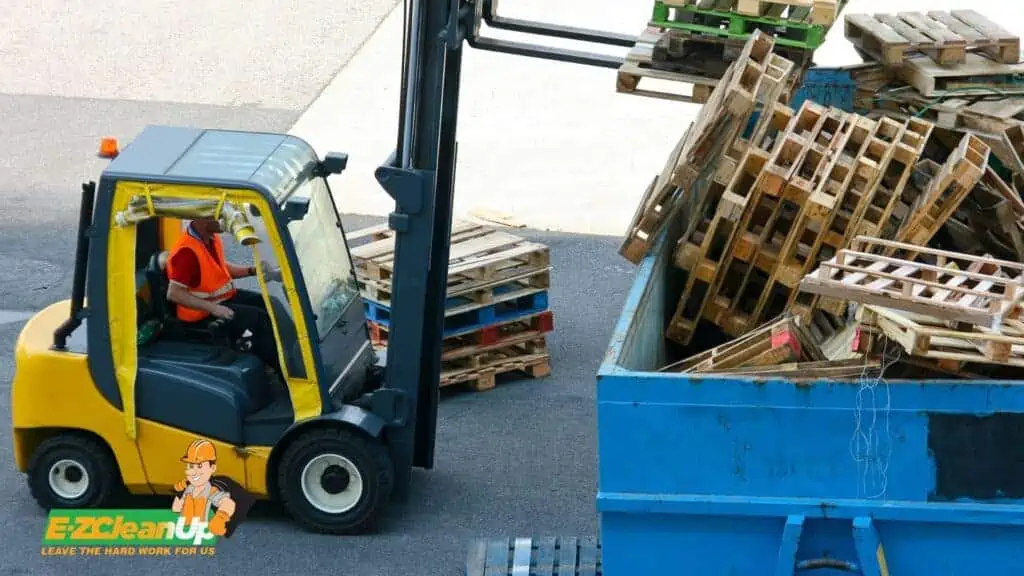
The Recycling Process and Benefits
The recycling process typically involves inspecting, sorting, repairing, or dismantling pallets. Repairable pallets are refurbished for reuse, while the ones damaged beyond repair are ground into wood chips for mulch, particleboard, or biomass fuel.
Recycling wood pallets significantly reduces the need for new raw materials. This means that it helps in conserving forests and reducing the energy and emissions associated with logging and manufacturing new pallets. For instance, it’s estimated that each ton of wood recycled saves about 17 trees.
By recycling old pallets, companies and individuals can avoid landfill fees. Pallet recycling can also create jobs in the green economy. From collection and transportation to processing and repurposing, each step in the recycling chain contributes to local employment opportunities.
Option #2: DIY Repurposing Projects
Here are some ideas on what you can do to reuse or repurpose wood pallets:
Furniture Creations
Wood pallets can be transformed into a variety of furniture items like coffee tables, chairs, beds, and shelves. For instance, a pallet bed frame can add a rustic charm to your bedroom while being cost-effective.
Garden Projects
Transform pallets into planters, compost bins, or vertical gardens. A vertical garden, in particular, is a space-saving solution for urban dwellers, which allows them to grow herbs and flowers even in limited spaces.
Art and Decor
Pallet wood can be used to create wall art, photo frames, or mirror frames, adding a unique aesthetic to any room. The natural texture of wood can complement both modern and traditional décor styles.
Outdoor Solutions
Build items like picnic tables, outdoor swings, or birdhouses. These projects enhance your outdoor living space while encouraging wildlife and nature-friendly practices.
Safety Guidelines for Handling Pallets
Observe the following when handling wood pallets:
- Inspection: Before starting any project, inspect pallets for nails, splinters, or broken planks. Choosing pallets in good condition minimizes injury risk.
- Treatment Awareness: Be aware of how the pallet was treated. Pallets marked with “HT” (Heat Treated) are generally safe, whereas those marked with “MB” (Methyl Bromide) should be avoided due to toxicity concerns.
- Protective Gear: Always use gloves, safety glasses, and appropriate tools when dismantling or modifying pallets. Sanding the wood is also recommended to prevent splinters and ensure a smooth finish.
- Ventilation: Work in a well-ventilated area, especially when sawing or painting pallet wood, to avoid inhaling dust or fumes.
Reducing Waste Through Creative Upcycling
Upcycling wood pallets offers the following benefits:
- Environmental Impact: Repurposing these pallets diverts them from landfills and decreases the demand for new raw materials.
- Resource Efficiency: Turning an old pallet into a new product saves trees and the energy that would be used in transporting and processing new materials.
- Personal Benefits: These activities can be fulfilling, therapeutic, and a practical way to develop new skills.
- Community Engagement: Sharing upcycling projects or organizing community workshops can inspire others to consider sustainable practices.
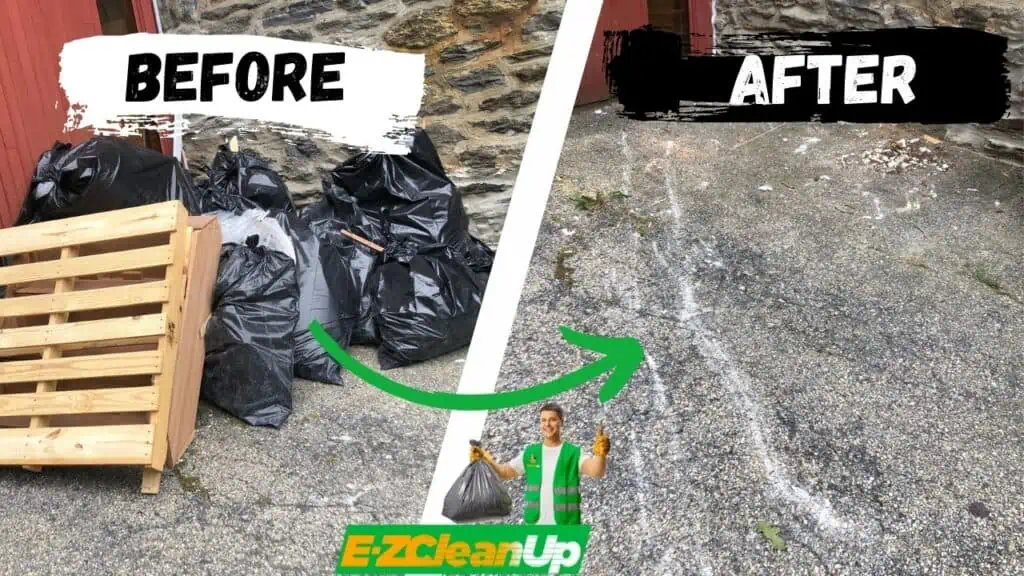
Option #3: Professional Pallet Removal Services
Professional services specialize in the efficient and safe removal of wood pallets. These experts have the necessary equipment and knowledge to handle various types and sizes of pallets and will see to it they are disposed of or recycled correctly.
For businesses or individuals dealing with large quantities of pallets, these services save significant time and labor. Instead of dealing with the disposal process themselves, which can be labor-intensive and time-consuming, hiring professionals simplifies the task.
Professional junk removal services stay informed about and comply with local and national disposal regulations. This compliance ensures that the disposal process is environmentally responsible, reducing the risk of illegal dumping or improper disposal, which can lead to environmental harm and potential fines.
Services Offered, Costs, and Scheduling Options
EZ CleanUP offers old wood pallet removal and proper disposal services. We collect, recycle, and, if necessary, repair and refurbish these pallets. When it comes to the cost of pallet removal, we charge based on the space the junk occupies in our truck. You can also call and ask for a free quote so you will know beforehand how much should you allocate for pallet removal.
Costs
Other junk removal services calculate the cost depending on several factors, including location, quantity of pallets, and the type of service required (e.g., standard removal vs. removal and recycling). Some companies charge a flat fee, while others may charge based on the volume or weight of the pallets.
Flexible Scheduling
Most pallet removal services offer flexible scheduling to accommodate the unique needs of their clients. This can include scheduled pickups for businesses with ongoing pallet disposal needs or one-time pickup services for individuals or smaller companies. Online booking and real-time scheduling updates are often available for convenience.
Custom Services
Some services provide tailored solutions, especially for businesses with specific needs or large volumes of pallets. These custom services can include onsite assessments, special handling for oversized or irregular pallets, and integration with the company’s supply chain management to streamline the disposal process.
How to Dispose of Wood Pallets – Challenges and Solutions
Here are some issues you must regularly check to know when you need to dispose of wood pallets:
Damaged Pallets
Damaged pallets can pose safety risks and are often unacceptable for standard recycling programs. You have to assess the extent of damage – minor damages can be repaired, and the pallets reused. For severely damaged pallets, components like undamaged wood can be salvaged for DIY projects or repurposed into chips or mulch.
Surplus Inventory
Companies often face the issue of surplus pallet inventory, which can consume valuable space and resources. Solutions include setting up a reverse logistics system to return pallets to the supplier, selling them to pallet recovery companies, or donating to local schools, community projects, or DIY enthusiasts who can repurpose them.
Here are the ways you or your company can do to efficiently manage excess pallets:
- Regular Assessment: Implementing a tracking system for pallet use and turnover can help identify and fix inefficiencies in their usage or storage.
- Developing a Pallet Management Plan: This plan should outline procedures for storing, repairing, and disposing of pallets to ensure they are managed efficiently throughout their lifecycle.
- Partnering with Recycling Services: These services often offer scheduled pickups, which can be a convenient and cost-effective way of dealing with large volumes of pallets regularly.
- Pallet Pooling/Sharing: This approach encourages the reuse of pallets across different companies and industries. It maximizes their utility and lifespan while minimizing waste.
- Implementing Just-in-Time (JIT) Delivery: By receiving goods only as needed, companies can reduce the accumulation of pallets waiting to be unloaded or used.
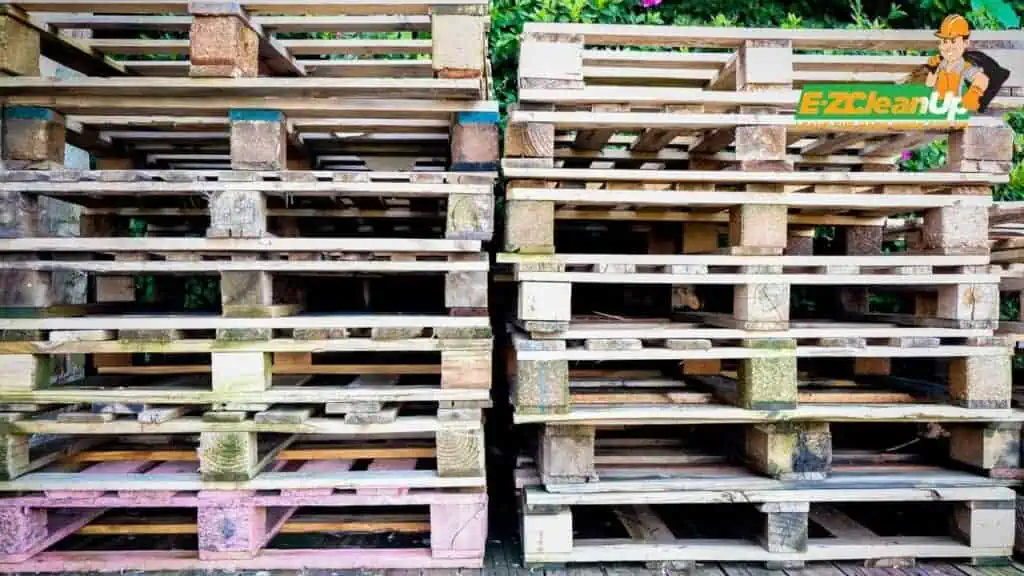
The Basics of Wood Pallets
Wood pallets generally come in two key types: stringer pallets and block pallets. Stringer pallets, often used in North America, use a frame of three or more parallel pieces of timber (stringers). Block pallets, more common in Europe, are supported by blocks of wood and can be accessed from all four sides.
The most common pallet size is the 48×40-inch (1219×1016 mm) pallet, also known as the GMA (Grocery Manufacturers Association) pallet. However, sizes can vary greatly to suit different needs, and pallets can be custom-built for specific loads or storage methods.
Wood pallets are primarily used for the transportation and storage of goods. They offer a stable base for assembling, storing, handling, and transporting materials. They are widely used in industries like food and beverage, pharmaceuticals, manufacturing, and more.
Lifespan and Durability
The lifespan of a wood pallet varies depending on factors such as the type of wood used, the weight of loads carried, and exposure to weather or chemicals. Typically, a well-maintained wood pallet can last anywhere from 3 to 5 years or more.
Regular maintenance and repairs can significantly extend a pallet’s useful life. This includes replacing broken boards or stringers and re-nailing loose parts.
Hardwood pallets are more durable and suited for heavier loads, while softwood pallets are lighter and less expensive but also less durable. The choice depends on the specific needs of the user, such as load weight and shipping conditions.
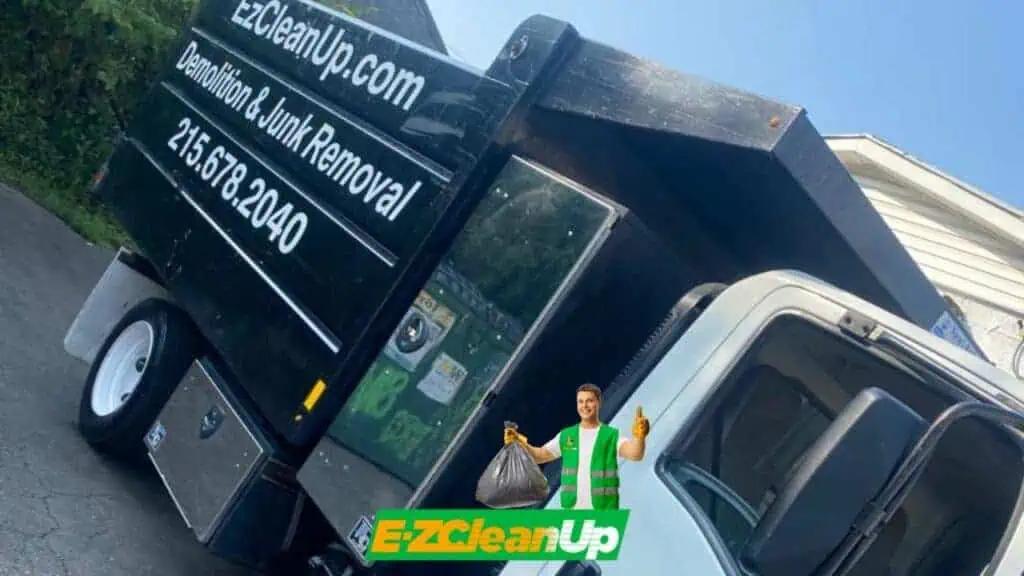
Why Proper Disposal of Wood Pallets Matters?
Wood pallets are often treated with chemicals to prolong their life and prevent pest infestation. When these treated pallets are improperly disposed of, such as being left to decay in landfills or in nature, they can release harmful chemicals into the soil and groundwater.
Moreover, these pallets contribute significantly to waste accumulation. In landfills, they take up a considerable amount of space and don’t decompose easily due to a lack of oxygen and sunlight. This results in an increase in waste and slower landfill degradation.
Many countries and regions have stringent laws and regulations regarding waste disposal, including wood pallets. Improper disposal can result in hefty fines and legal penalties, besides tarnishing the reputation of businesses or individuals.
FAQs – How to Dispose of Wood Pallets
How Can I Tell if a Wood Pallet Is Safe for DIY Projects?
Make sure the pallet is stamped with “HT” (heat-treated) rather than “MB” (methyl bromide), which indicates it’s safe for reuse. Additionally, inspect for any obvious signs of contamination, such as stains or strong odors, which might suggest it’s not suitable for household projects.
Can I Just Throw Away Old Wood Pallets in My Regular Trash?
Disposing of wood pallets with your regular trash isn’t recommended and is often not permitted by municipal waste management regulations. It’s more environmentally responsible and sometimes legally necessary to recycle them or find an appropriate waste removal service.
Are there Any Legal Requirements I Should Be Aware of when Disposing of Wood Pallets?
Yes, different areas have different regulations regarding the proper waste disposal of wood pallets, particularly if they’re considered commercial waste. It’s important to check with your local government or waste management authorities to understand the regulations and avoid potential fines.
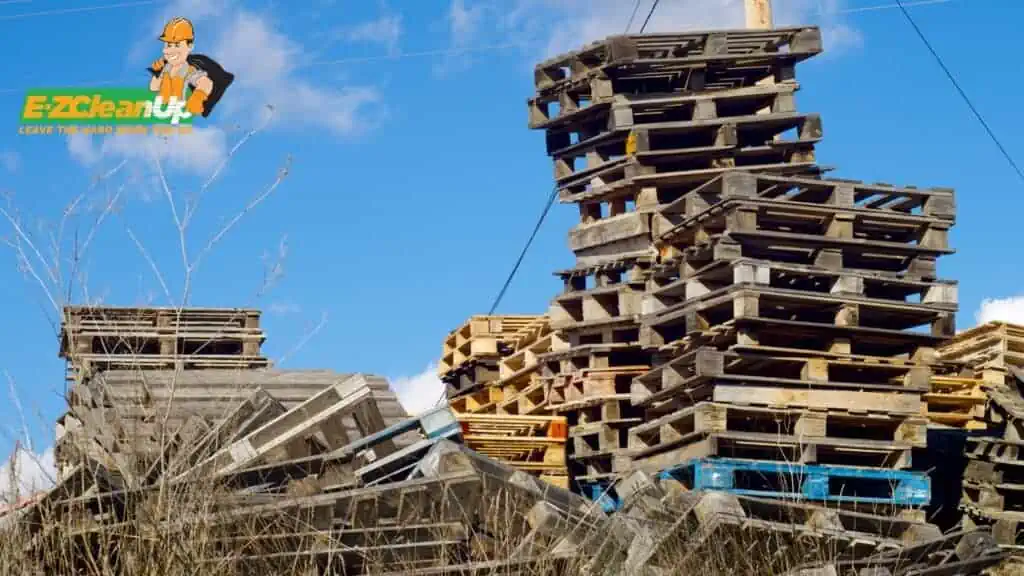
Conclusion
Disposing of wood pallets properly is important for environmental protection, legal compliance, and promoting sustainable practices. Whether through recycling, creative DIY repurposing, or hiring professional removal services, there are various effective ways to handle old pallets.
Recycling helps conserve resources and reduce waste while repurposing can spark creativity and offer practical solutions for home and garden use. For those who prefer a hassle-free approach, professional removal services offer a convenient solution.
In Philly or neighboring counties and need assistance with pallet removal? Look no further than EZ CleanUp. We specialize in dealing with the tough stuff. From an estate cleanout, yard cleanup, garage cleanout, to responsibly removing unwanted wood pallets, our focus is on providing fast, efficient service with an emphasis on eco-friendly disposal.
Contact EZ CleanUp now for all your junk removal needs, and let us help you manage the disposal of your wooden pallets the right way.


